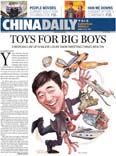Society
Authorities calling for wage rises
Updated: 2011-04-20 07:47
By Chen Xin (
China Daily
)Ministry targets non-public firms in labor-intensive industries for hikes
BEIJING - Chinese labor authorities are aiming to have the wages of business employees rise by 15 percent a year during the next five years.
One step toward that goal will be taken through reforms made to the means businesses use to distribute wages, said Yang Zhiming, vice-minister of human resources and social security, at a national work conference on labor relations on Monday.
The main targets of the changes will be non-public businesses in labor-intensive industries. Collective bargaining will occur at such places to help ensure that the wages they pay rise in a regular manner, he said.
He said human resource and social security bureaus throughout the country will continue to release guidelines on local wages and to provide basic rules for collective bargaining.
He said workers should enjoy wages that rise at the same or a faster pace than their employers' profits.
"The country will try to make sure employees earn wages that rise by 15 every year, so we can realize a target set out in the 12th Five-Year Plan (2011-2015) period, calling for such wages to be doubled (from what they were from 2006 to 2010)," he said.
For many people, the labor authorities' plan comes at a good time, when the annualized rise in the country's consumer price index - a standard gauge of inflation - hit a high of 5.4 percent in March.
But some doubt that their wages will increase as quickly as labor authorities want.
Liu Junsheng, a researcher with the labor and wage institute affiliated with the Ministry of Human Resources and Social Security, said the goal of having wages rise by 15 percent a year can be reached but only with some difficulty.
"Although a rise in wages will increase an enterprise' labor costs, especially for the many small- and medium-sized firms that make small profits, the government can offer policies such as tax exemptions and free training to employees and bosses to help these businesses continue to exist and expand," he told China Daily on Tuesday.
Liu said many businesses regularly make profits but do not turn around and increase the wages of those they employ. Collective bargaining will help to ensure workers can negotiate wages with employers, he said.
"In China, employees' wages are still low compared to many other countries," Liu said. "There is much room for increases."
Chinese employees' wages rose 15.3 percent a year on average from 2006 to 2009, according to Liu.
Yang said Chinese authorities will try to make sure that minimum wages rise by 13 percent a year in all provinces over the next five years.
The country also has set a goal of ensuring that migrant workers who are owed pay from employers receive that pay by 2013, he said.
E-paper

Han me downs
Traditional 3,000-year-old clothes are making a comeback.
Reaching out
Fast growth fuels rise in super rich
Chinese tourists spend more
Specials

Big spenders
More mainland tourists are expected to spend money on overseas travel this year.

Rise in super rich
Report cites rising property prices, gdp as key drivers of increasing number of chinese millionaires.

Reaching out
Condom makers are stepping up their presence in smaller cities to boost sales




